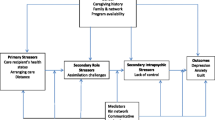Abstract
The impact of immigration on parents left behind has been largely ignoredin the literature. This exploratory study uses cultural specificity theory toexamine the effect an adult child's emigration has on the familial supportsystem available to the parents left behind, and on the parent'spsychological well-being. Twenty-nine parents (age 55+) in India, who hadadult children in the United States, were selected using snowball sampling.Qualitative interviews based on a semi-structured interview schedule wereconducted during the fall and winter of 1997. Results show that althoughmost parents do not live in an extended family, they receive support fromextended family members. However, the biggest source of daily supportcomes from hired help. Hired help allows parents to live independently anddecreases reliance on informal support systems. Since hired help isrelatively inexpensive most parents can substitute help for their children.This does not alleviate feelings of loneliness and depression.
Similar content being viewed by others
References
Bisht, S. & Sinha, D. (1981). Socialization, family, and psychological differentiation. In D. Sinha (eds), Socialization of the Indian Child (pp. 41–54). New Delhi: Concept Publishing Co.
Biswas, S. & Tripati, T. (1990). A comparative study of employment situation of the aged, Man in India 70: 26–46.
Boss, P. G. (1993). The experience of immigration for the mother left behind: The use of qualitative feminist strategies to analyze letters from my Swiss grandmother to my father, Marriage and Family Review 19: 365–378.
Buhler, G. (1886). The laws of Manu, translated with extracts from seven commentaries.Oxford: Clarendon Press.
Chakrabati, T. K. (1978). Hindu marriages in Calcutta, Journal of Comparative Family Studies 9: 367–372.
Chekki, D. A. (1988). Recent directions in family research: India and North America, Journal of Comparative Family Studies XIX: 171–186.
Conklin, G. (1976). The household in urban India, Journal of Marriage and the Family 38: 771–779.
Davis, M. (1977). Rank & rivalry in the Bengali Hindu family, The Eastern Anthropologist 30: 67–87.
Dharmalingam, A. (1994). Old age support: Expectations and experiences in a South Indian village, Population Studies 48: 5–19.
Dworkin, A. G., & Dworkin, R. J. (1988). Interethnic stereotypes of acculturating Asian Indians in the United States, Plural Societies 18: 61–70.
Fruzzett, L. M. (1982). The gift of a virgin: Women, marriage, and ritual in a Bengali society.New Brunswick: Rutgers University Press.
Hendricks, J. & Hendricks, C. D. (1979). Concerning old age: Interdisciplinary dimensions. In J. Hendricks & C. D. Hendricks (eds), Dimensions of aging: Readings (pp. 1–7). Cambridge, MA: Winthrop.
Kim, K. C., Kim, S. & Hurh, W. M. (1991). Filial piety and intergenerational relationship in Korean immigrant families, International Journal of Aging and Human Development 33:233–245.
Krishnan, A. & Berry, J. W. (1992). Acculturative stress and acculturation attitudes among Indian immigrants to the United States, Psychology and Developing Societies 4: 187–212.
Lal, K. A. (1990). The urban family: A study of the Hindu social system. New Delhi: Concept Publishing Company.
Mehta, S. (1998). Relationship between acculturation and mental health for Asian Indian immigrants in the United States, Genetic, Social, and general psychology monographs 124: 61–78.
Osako, M. M., & Liu, W. T. (1986). Intergenerational relations and the aged among Japanese Americans, Research on Aging 8: 128–155.
Pettys, G. L., & Balgopal, P. R. (1998). Multigenerational conflicts and new immigrants: An Indo-American experience, Families in Society: The Journal of Contemporary Human Services 79: 410–423.
Pothens, S. (1989). Divorce in Hindu society, Journal of Comparative Family Studies 20:377–392.
Prabhu, P. H. (1963). Hindu social organization: A study in socio-psychological and ideological foundations. Bombay: Popular Prakashan.
Rani, D. U. (1989). Old age security value of children – A case study of scheduled and non-scheduled castes. In R. N. Pati & B. Jena (eds), Aged in India: Socio-demograpic dimensions (pp. 133–166). New Delhi: Ashish Publishing House.
Rani, D. U., Rajasekhar, M., & Naidu, D. A. (1989). Old age security and utility of children. In R. N. Pati & B. Jena (eds), Aged in India Socio-Demographic Dimensions (pp. 47–58). New Delhi: Ashish Publishing House.
Reddy, P. J. (1989). Inter-generational support: A reality or myth. In R. N. Pati & B. Jena (eds), Aged in India Socio-Demographic Dimensions (pp. 180–198). New Delhi: Ashish Publishing House.
Registrar General and Census Commissioner. (1991). Census of India, 1991. Delhi: Controller of Publications.
Roland, A. (1988). In search of self in India and Japan: Toward a cross-cultural psychology. Princeton, N.J.: Princeton University Press.
Sinha, D. (1984). Some recent changes in the Indian family and their implications for socialisation, The Indian Journal of Social Work 69: 338–348.
Sinha, J. (1990). The salient Indian values and their socio-ecological roots, The Indian Journal of Social Science 3: 477–488.
Srivastava, R. C. (1994). The problem of the old age. New Delhi: Classical Publishing Company.
Steiner, G. L., & Bansil, R. K. (1989). Cultural patterns and the family system in Asian Indians: Implications for psychotherapy, Journal of Comparative Family Studies 20:371–375.
Thorton, A., Chang, M., & Sun, T. (1984). Social and economic change, intergenerational relationships, and family formation in Taiwan, Demography 21; 475–499.
vanWilligen, J., Chadha, N. K.,& Kedia, S. (1995). Personal networks and sacred texts: Social aging in Delhi, India, Journal of cross-cultural gerontology 10: 175–198.
Vlassoff, C. (1990). The value of sons in an Indian village: How widows see it, Population Studies 44: 5–20.
Vlassoff, M., & Vlassoff, C. (1980). Old age security and the utility of children in rural India, Population Studies 34: 487–499.
Ying, Y. (1994). Chinese American adult’s relationship with their parents, The International Journal of Social Psychiatry 40: 35–45.
Yu, L. C., & Wu, S. (1985). Unemployment and family dynamics in meeting the needs of Chinese elderly in the United States, The Gerontologist 25: 472–476.
Author information
Authors and Affiliations
Rights and permissions
About this article
Cite this article
Miltiades, H.B. The social and psychological effect of an adult child's emigration on non-immigrant Asian Indian elderly parents. Journal of Cross-Cultural Gerontology 17, 33–55 (2002). https://doi.org/10.1023/A:1014868118739
Issue Date:
DOI: https://doi.org/10.1023/A:1014868118739




